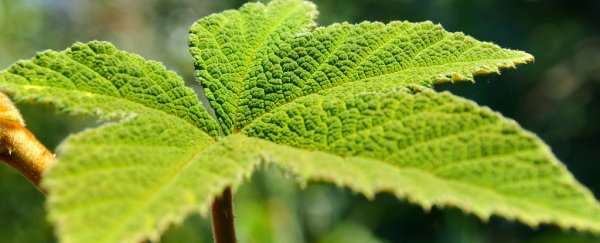It's something that plant lovers have long suspected, but now Australian scientists have found evidence that plants really can feel when we're touching them.
Not only that, but different sensations trigger a cascade of physiological and genetic changes, depending on the stimulation the plants are receiving, whether it's a few drops of rain, or a little soft pat, which is probably the coolest thing we've heard all week.
"Although people generally assume plants don't feel when they are being touched, this shows that they are actually very sensitive to it," said lead researcher Olivier Van Aken from the University of Western Australia.
"While plants don't appear to complain when we pinch a flower, step on them or just brush by them while going for a walk, they are fully aware of this contact and are rapidly responding to our treatment of them," he added.
But first thing's first, let's not get ahead of ourselves and anthropomorphise the crap out of this situation, as we humans love to do. Although this whole thing sounds super adorable and touchy feely, plants don't have brains and they don't 'think'.
We also don't have evidence to suggest that they actually 'feel' in any way resembling our perception of the sense.
That said, previous research has shown that plants do have pretty good awareness of their surroundings. For example, they can 'hear' when they're being chewed on by insects, and release chemicals to stop it. And they're also able to communicate with each other via a subterranean 'internet' of fungus.
While there's no visible response to any of this stimulus, what this input does is help the plant stay aware of its surroundings and prepare itself for any potential danger, or get ready to take advantage of changing weather conditions.
One thing the scientists found was that spraying water droplets on plants caused them to change the expression of thousands of genes - a dramatic physiological response that started within minutes of the stimulus and stopped within half an hour.
"We were able to show that this response was not caused by any active compounds in the spray but rather by the physical contact caused by water drops landing on the leaf surface," says Van Aken.
Curious to know how else they might respond, the team also found that gently patting the plants or touching them with tweezers could trigger a similar physiological cascade. So could a sudden shadow falling over their leaves.
All of this information could be essential to plants survival in the wild, the researchers explain in the journal Plant Physiology.
"Unlike animals, plants are unable to run away from harmful conditions. Instead, plants appear to have developed intricate stress defence systems to sense their environment and help them detect danger and respond appropriately," says Van Aken.
Importantly, the study also identified two proteins that could switch off the plant's touch response. In the future, this could help plants in controlled environments, such as greenhouses, from changing their genes and responding to 'false alarm' stimuli.
One study on its own obviously isn't enough to overhaul our understanding of plant stimulation perception, and more research is needed to replicate the finds. But for now, maybe we should all be more thoughtful when we're prodding and poking our plants, or blocking their light with our giant human heads.
The good news? Singing seems to be pretty safe. "As yet, there's no evidence to back the idea held by some people that the vibrations caused by just talking to plants has a strong enough effect to move plants," Van Aken told Peter Spinks from the The Age.
BRB, going to sing some Frank Sinatra to my ficus.
